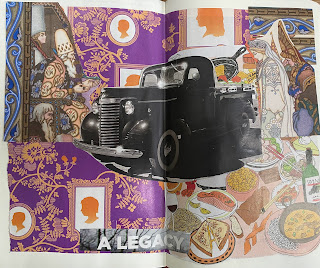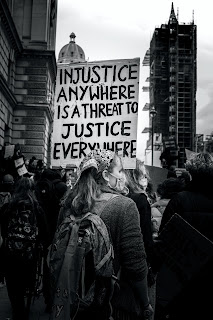Day 62 – Earning our death and fighting the lovers’ quarrel
Day 62 
Photo by Steven Wright on Unsplash
It seems to me that one ought to rejoice in the fact of death—ought to decide, indeed, to earn one’s death by confronting with passion the conundrum of life. One is responsible to life: It is the small beacon in that terrifying darkness from which we come and to which we shall return. One must negotiate this as nobly as possible, for the sake of those who are coming after us.
In The fire next time James Baldwin (1962), wrote that we must “earn our death by confronting with passion the conundrum of life.” Somehow this reminds me of Debbie Allen’s commencement speech back in 2001 – she ended by encouraging us to have a lovers’ quarrel with the world! And by extension I think of the lovers’ quarrel I have been having with expressive arts therapy for more than 40 years.
I came to the program at Lesley University as a student back in 1982 and have been confronting the conundrum of life with passion and with retreat since then. I remember feeling that aside from my love of music, the thing that motivated me the most and that I felt I understood about the arts in therapy was that both the arts and therapy were built on relationships – and I wanted relationships to be at the core of what I did with my life.
Looking back, I believe that I was driven by a profound loneliness. I have come to understand that relationships mean very different things to people depending on their early and later experiences of relationships – with family, friends, things, ideas. I can see now that not everyone is as driven to be in relationship with relationship as I am – I say it this way, because my relationship to having relationships is very complicated… maybe it is for us all! I need them, I avoid them, I control them, I dismiss them, I bask in them, and I skim along the surface.
One of the relationships I have been cultivating the most, over the past year, has been a relationship to the “theory” of expressive arts therapy (ExAT). First, I think there is no “singular” here – no one theory, but rather, multiple approaches/multiple theories. Second, as with all my relationships, I have been playing hide-and-seek with ExAT theory. Third, I am compelled by the idea of finding a way to bring the concept of social justice to the idea of ExAT. How do these two concepts inform one another – it’s not just that ExAT needs to be informed by social justice – but perhaps that social justice can be informed by ExAT (or at the least, some underlying aspects of ExAT).
Key to social justice work is an acknowledgement of the “social” part of what we do and the “justice” part of what we do. How does the social milieu/landscape inform our understanding of our work with others? And how does the experience of justice – of fairness, impartiality (is this the same as unconditional?), and of a sense of what is right, inform our understanding of our work?
How do our philosophical foundations help us to understand or even “problematize” these ideas? How do we pick a lovers’ quarrel with our desire to do socially just work?
It seems one way we cultivate the capacity for socially just work – is to pay attention!!!
In her book, Syllabus: Notes from an accidental professor, the cartoonist Lynda Barry tells us of her earliest lesson in paying attention – she writes that her teacher, Marilyn says,
How do you stop saying ‘nothing happened’
one way: pay attention, be quiet and see what’s there
not agree with, understand, like,
JUST SEE
24 hour period, moving back
to see what was there
The nature of this 24 hour period
Feeling/Tone
I’m working on it!!



Comments